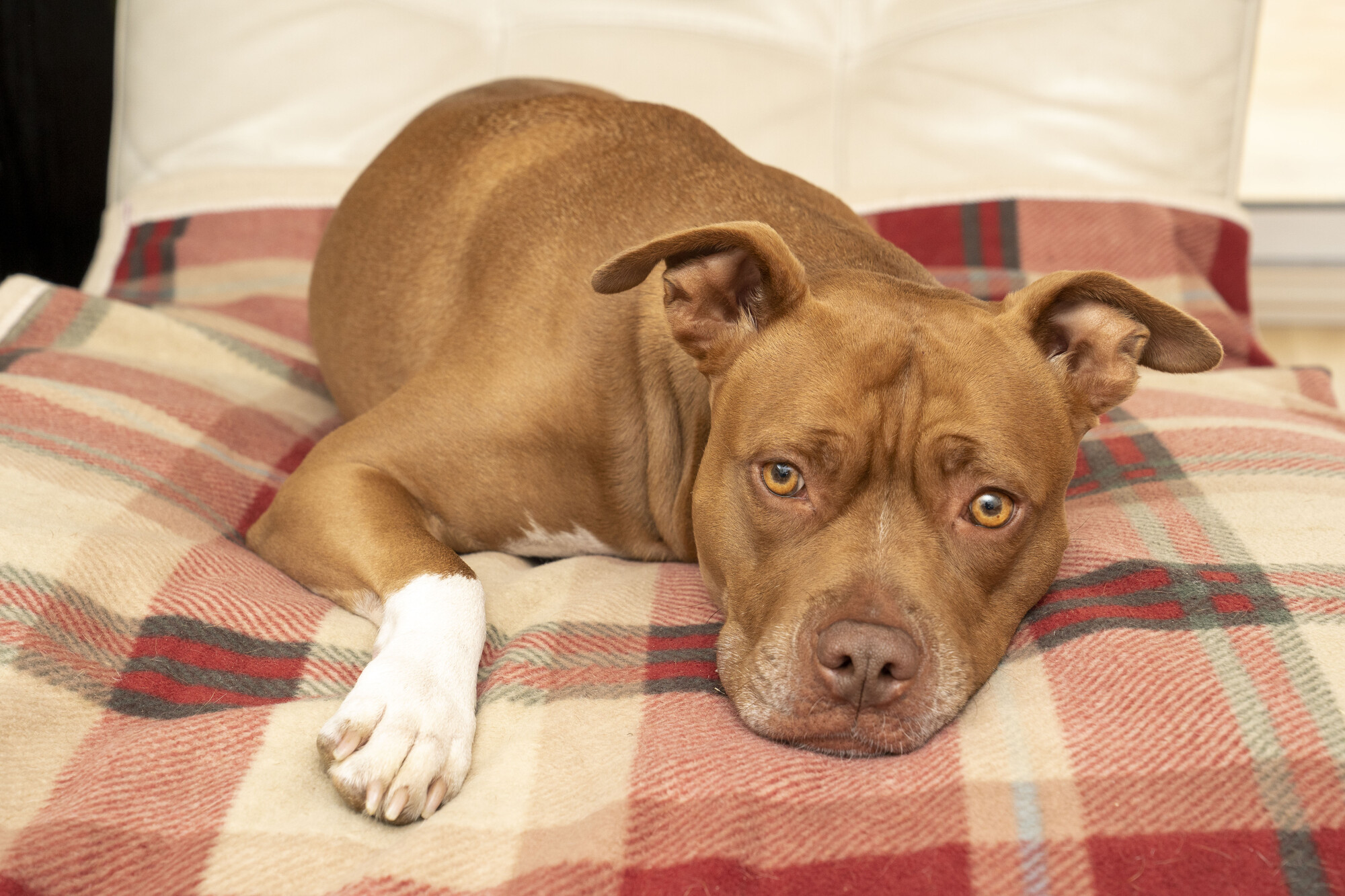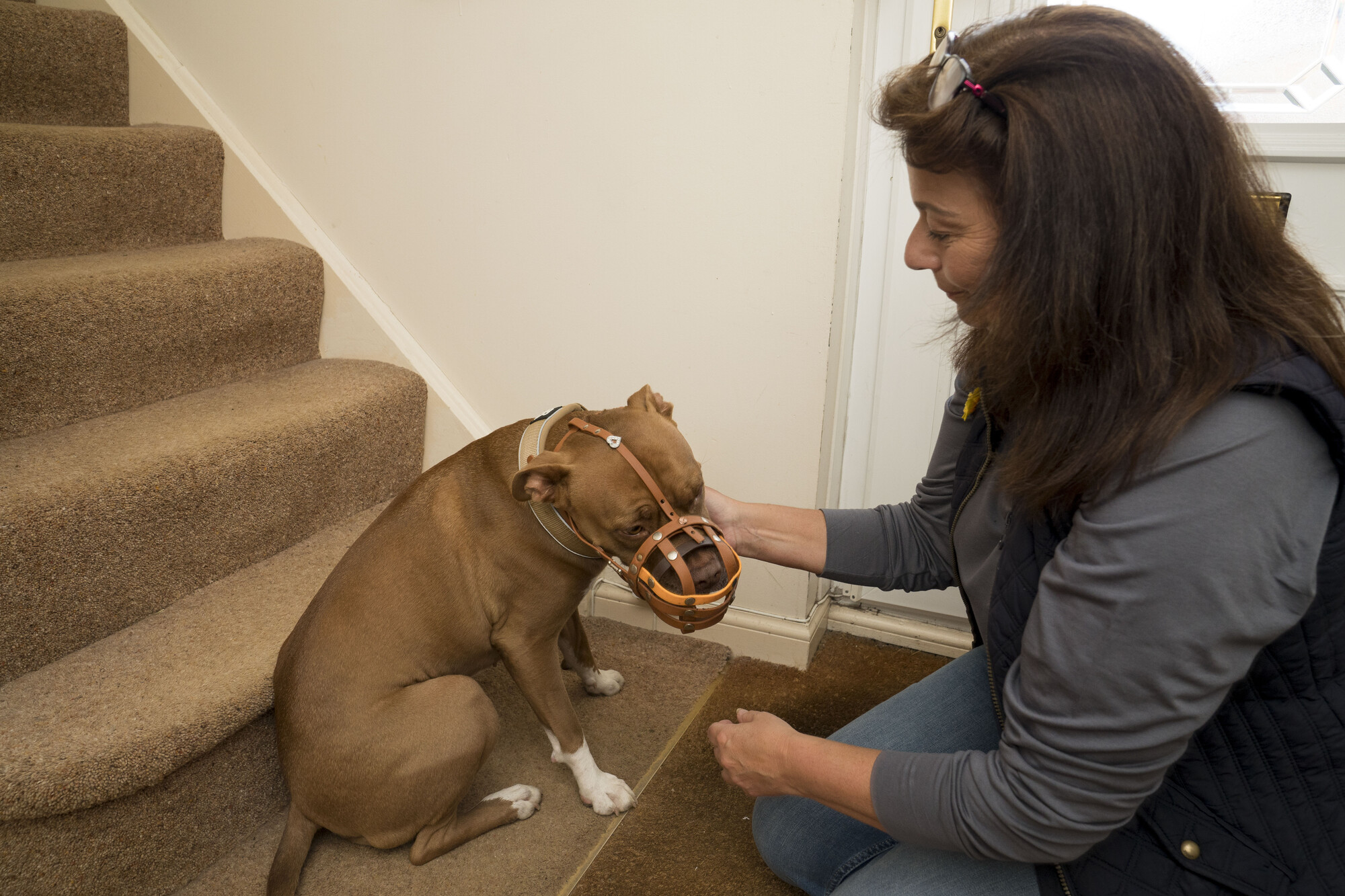
Loving family pet vilified and condemned to life in a muzzle due to barbaric law
Every year, loving family dogs just like Lola find themselves condemned to death or lifelong restrictions due to a cruel and failing law demonising bull breeds.
Section one of the Dangerous Dogs Act, often referred to as Breed Specific Legislation (BSL) is 30 years old today (12 August), and in its time, has penalised thousands of innocent dogs deemed to be a threat to society due their looks alone.
The law bans pit bull terriers, Japanese tosas, dogo Argentinos and fila Brasilieros. But the legislation specifically mentions types rather then breed, meaning that assessment of whether a dog is illegal is based on arbitrary measurements rather then any sort of DNA test. So, crossbreeds can be 'typed' as a pit bull, as can just one of four puppies in the same litter.
The only way to spare a dog’s life once they are ‘typed’ is an often lengthy and costly court battle to gain an exemption order by proving they’re not dangerous.
Blue Cross has for many years called for this killer law to be repealed to end injustice and suffering for animals and their owners up and down the country.
On this milestone date, we again call for the government to take action with your help, alongside the support of dog owner Anita Medhi, whose beloved pet was seized by police without warning in 2019.
Lola, who was nearly three years old at the time, was kept by officers for two nights after they deemed the affectionate American bulldog cross staffie a risk because a tape measure rather than genetics or temperament deemed her to be a pit bull terrier.
Anita, who was forced to plead guilty in court to owning a banned dog, said: “I never knew anything about BSL until I came home one day to a police van outside my house.
“She [Lola] was crying and trembling and I had to put her in the back of the cage in the van and they just shut the door.

“They wouldn't let me give her anything with my scent on, wouldn’t let me give her some of her own food, toy or blanket or anything. And to this day, I don't know where they took her. They just drove off and just left me.”
Neighbours and Lola’s vet were queueing up to give character statements about what a wonderful pet she was, and a thorough police assessment confirmed all testimonies.
A court then ruled that she presented no risk to the public, but the rigid law still meant she received a sentence of lifelong restrictions, including wearing a muzzle at all times in public, even if she’s travelling inside a car.
Lola was so traumatised by her two days in kennels that she had stopped eating and began urinating around the house once she was returned home – something she had never done before.
And, worse still, she couldn’t be walked for two months as it took that amount of time – with help from the Blue Cross Behaviour Team – to get her used to suddenly wearing a muzzle.
Anita, 56, is still traumatised by the ordeal and continues to look over her shoulder when out.
She continues: “Lola's happy, but it's nowhere near the life that she used to have . And I tend to take her out just once a day because she's not interested in going out again as she knows she’s going to be on lead and muzzled. We used to go out four or five times a day before.
“When you’re on a walk and she sees other dogs off lead and chasing the ball around she’s always looking as if to say: ‘Well, why can't I play? Why can't I join in?'”
Lola is, however, one of the lucky ones. Many dogs like her are euthanised, either because they don’t have an owner to fight for them or the stress of being confined to bad kennel conditions causes so much stress that they do not pass the assessment.
Blue Cross has sadly been forced to euthanise a number of stray bull breeds ‘typed’ by dog wardens because, under law, we are prohibited from rehoming them. Dogs like Duncan.
And it’s not unusual for dogs to spend months, or even years, in police kennels awaiting a court date for a judge to decide whether they’re allowed to live.

Becky Thwaites, Head of Public Affairs at Blue Cross, said: “Sadly there are thousands of dogs just like Lola who have not put a paw out of place but have to pay the price for this unjust law.
“Many dogs that are seized as illegal types are in fact well-behaved dogs with responsible owners, who just have the misfortune to have the wrong measurements.
“It is heart-breaking and extremely frustrating for all our teams when they are forced to euthanise an otherwise healthy and friendly pet, or in Lola’s case have their liberties curtailed, simply because the law states their looks deem them dangerous.
“The years following the implementation of the Dangerous Dogs Act have shown that vilifying certain breeds of dog does not serve to reduce the number of dog attacks, which have only increased.
“The government needs to focus on cracking down on dog owners who use their dogs for illegal and irresponsible purposes rather than banning breeds based solely on how they look.”
Anita, who has also launched her own petition, continued: “I just think it [the law] is absolutely ridiculous. It's ridiculous that you can judge how dangerous a dog is, by a tape measure.
“I'm all for the public being protected – of course, it goes without saying that you can't have dangerous dogs, but they’re targeting the wrong end of the lead. I know it's a cliche, but it's very, very true that it's responsible owners that are getting punished.
“Police should be going for the people that breed dogs that are fighting them.”

Our campaign to end breed specific legislation

Our campaign to end breed specific legislation



